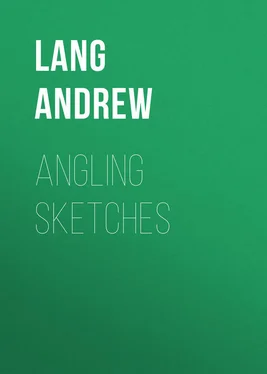Andrew Lang - Angling Sketches
Здесь есть возможность читать онлайн «Andrew Lang - Angling Sketches» — ознакомительный отрывок электронной книги совершенно бесплатно, а после прочтения отрывка купить полную версию. В некоторых случаях можно слушать аудио, скачать через торрент в формате fb2 и присутствует краткое содержание. Жанр: foreign_antique, foreign_prose, на английском языке. Описание произведения, (предисловие) а так же отзывы посетителей доступны на портале библиотеки ЛибКат.
- Название:Angling Sketches
- Автор:
- Жанр:
- Год:неизвестен
- ISBN:нет данных
- Рейтинг книги:3 / 5. Голосов: 1
-
Избранное:Добавить в избранное
- Отзывы:
-
Ваша оценка:
- 60
- 1
- 2
- 3
- 4
- 5
Angling Sketches: краткое содержание, описание и аннотация
Предлагаем к чтению аннотацию, описание, краткое содержание или предисловие (зависит от того, что написал сам автор книги «Angling Sketches»). Если вы не нашли необходимую информацию о книге — напишите в комментариях, мы постараемся отыскать её.
Angling Sketches — читать онлайн ознакомительный отрывок
Ниже представлен текст книги, разбитый по страницам. Система сохранения места последней прочитанной страницы, позволяет с удобством читать онлайн бесплатно книгу «Angling Sketches», без необходимости каждый раз заново искать на чём Вы остановились. Поставьте закладку, и сможете в любой момент перейти на страницу, на которой закончили чтение.
Интервал:
Закладка:
But this was not legitimate business. Not till we came to fly-fishing were we really entered at the sport, and this initiation took place, as it chanced, beside the very stream where I was first shown a trout. It is a charming piece of water, amber-coloured and clear, flowing from the Morvern hills under the limes of an ancient avenue – trees that have long survived the house to which, of old, the road must have led. Our gillie put on for us big bright sea-trout flies – nobody fishes there for yellow trout; but, in our inexperience, small “brownies” were all we caught. Probably we were only taken to streams and shallows where we could not interfere with mature sportsmen. At all events, it was demonstrated to us that we could actually catch fish with fly, and since then I have scarcely touched a worm, except as a boy, in burns. In these early days we had no notion of playing a trout. If there was a bite, we put our strength into an answering tug, and, if nothing gave way, the trout flew over our heads, perhaps up into a tree, perhaps over into a branch of the stream behind us. Quite a large trout will yield to this artless method, if the rod be sturdy – none of your glued-up cane-affairs. I remember hooking a trout which, not answering to the first haul, ran right across the stream and made for a hole in the opposite bank. But the second lift proved successful and he landed on my side of the water. He had a great minnow in his throat, and must have been a particularly greedy animal. Of course, on this system there were many breakages, and the method was abandoned as we lived into our teens, and began to wade and to understand something about fly-fishing.
It was worth while to be a boy then in the south of Scotland, and to fish the waters haunted by old legends, musical with old songs, and renowned in the sporting essays of Christopher North and Stoddart. Even then, thirty long years ago, the old stagers used to tell us that “the waiter was owr sair fished,” and they grumbled about the system of draining the land, which makes a river a roaring torrent in floods, and a bed of grey stones with a few clear pools and shallows, during the rest of the year. In times before the hills were drained, before the manufacturing towns were so populous, before pollution, netting, dynamiting, poisoning, sniggling, and the enormous increase of fair and unfair fishing, the border must have been the angler’s paradise. Still, it was not bad when we were boys. We had Ettrick within a mile of us, and a finer natural trout-stream there is not in Scotland, though now the water only holds a sadly persecuted remnant. There was one long pool behind Lindean, flowing beneath a high wooded bank, where the trout literally seemed never to cease rising at the flies that dropped from the pendant boughs. Unluckily the water flowed out of the pool in a thin broad stream, directly it right angles to the pool itself. Thus the angler had, so to speak, the whole of lower Ettrick at his back when he waded: it was a long way up stream to the bank, and, as we never used landing-nets then, we naturally lost a great many trout in trying to unhook them in mid water. They only averaged as a rule from three to two to the pound, but they were strong and lively. In this pool there was a large tawny, table-shaped stone, over which the current broke. Out of the eddy behind this stone, one of my brothers one day caught three trout weighing over seven pounds, a feat which nowadays sounds quite incredible. As soon as the desirable eddy was empty, another trout, a trifle smaller than the former, seems to have occupied it. The next mile and a half, from Lindean to the junction with Tweed, was remarkable for excellent sport. In the last pool of Ettrick, the water flowed by a steep bank, and, if you cast almost on to the further side, you were perfectly safe to get fish, even when the river was very low. The flies used, three on a cast, were small and dusky, hare’s ear and woodcock wing, black palmers, or, as Stoddart sings,
Wee dour looking huiks are the thing,
Mouse body and laverock wing.
Next to Ettrick came Tweed: the former river joins the latter at the bend of a long stretch of water, half stream, half pool, in which angling was always good. In late September there were sea-trout, which, for some reason, rose to the fly much more freely than sea-trout do now in the upper Tweed. I particularly remember hooking one just under the railway bridge. He was a two-pounder, and practised the usual sea-trout tactics of springing into the air like a rocket. There was a knot on my line, of course, and I was obliged to hold him hard. When he had been dragged up on the shingle, the line parted, broken in twain at the knot; but it had lasted just long enough, during three exciting minutes. This accident of a knot on the line has only once befallen me since, with the strongest loch-trout I ever encountered. It was on Branxholme Loch, where the trout run to a great size, but usually refuse the fly. I was alone in a boat on a windy day; the trout soon ran out the line to the knot, and then there was nothing for it but to lower the top almost to the water’s edge, and hold on in hope. Presently the boat drifted ashore, and I landed him – better luck than I deserved. People who only know the trout of the Test and other chalk streams, cannot imagine how much stronger are the fish of the swift Scottish streams and dark Scottish lochs. They’re worse fed, but they are infinitely more powerful and active; it is all the difference between an alderman and a clansman.
Tweed, at this time, was full of trout, but even then they were not easy to catch. One difficulty lay in the nature of the wading. There is a pool near Ashiesteil and Gleddis Weil which illustrated this. Here Scott and Hogg were once upset from a boat while “burning the water” – spearing salmon by torchlight. Herein, too, as Scott mentions in his Diary, he once caught two trout at one cast. The pool is long, is paved with small gravel, and allures you to wade on and on. But the water gradually deepens as you go forward, and the pool ends in a deep pot under each bank. Then to recover your ground becomes by no means easy, especially if the water is heavy. You get half-drowned, or drowned altogether, before you discover your danger. Many of the pools have this peculiarity, and in many, one step made rashly lets you into a very uncomfortable and perilous place. Therefore expeditions to Tweedside were apt to end in a ducking. It was often hard to reach the water where trout were rising, and the rise was always capricious. There might not be a stir on the water for hours, and suddenly it would be all boiling with heads and tails for twenty minutes, after which nothing was to be done. To miss “the take” was to waste the day, at least in fly-fishing. From a high wooded bank I have seen the trout feeding, and they have almost ceased to feed before I reached the waterside. Still worse was it to be allured into water over the tops of your waders, early in the day, and then to find that the rise was over, and there was nothing for it but a weary walk home, the basket laden only with damp boots. Still, the trout were undeniably there , and that was a great encouragement. They are there still, but infinitely more cunning than of old. Then, if they were feeding, they took the artificial fly freely; now it must be exactly of the right size and shade or they will have none of it. They come provokingly short, too; just plucking at the hook, and running out a foot of line or so, then taking their departure. For some reason the Tweed is more difficult to fish with the dry fly than – the Test, for example. The water is swifter and very dark, it drowns the fly soon, and on the surface the fly is less easily distinguished than at Whitchurch, in the pellucid streams. The Leader a tributary, may be fished with dry fly; on the Tweed one can hardly manage it. There is a plan by which rising trout may be taken – namely, by baiting with a small red worm and casting as in fly-fishing. But that is so hard on the worm! Probably he who can catch trout with fly on the Tweed between Melrose and Holy Lee can catch them anywhere. On a good day in April great baskets are still made in preserved parts of the Tweed, but, if they are made in open water, it must be, I fancy, with worm, or with the “screw,” the lava of the May-fly. The screw is a hideous and venomous-looking animal, which is fixed on a particular kind of tackle, and cast up stream with a short line. The heaviest trout are fond of it, but it can only be used at a season when either school or Oxford keeps one far from what old Franck, Walton’s contemporary, a Cromwellian trooper, calls “the glittering and resolute streams of Tweed.”
Читать дальшеИнтервал:
Закладка:
Похожие книги на «Angling Sketches»
Представляем Вашему вниманию похожие книги на «Angling Sketches» списком для выбора. Мы отобрали схожую по названию и смыслу литературу в надежде предоставить читателям больше вариантов отыскать новые, интересные, ещё непрочитанные произведения.
Обсуждение, отзывы о книге «Angling Sketches» и просто собственные мнения читателей. Оставьте ваши комментарии, напишите, что Вы думаете о произведении, его смысле или главных героях. Укажите что конкретно понравилось, а что нет, и почему Вы так считаете.












